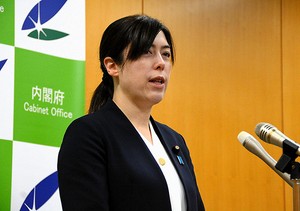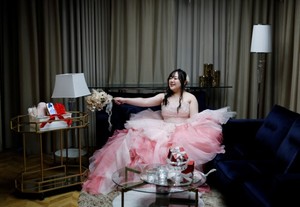By NAOTAKA FUJITA/ Senior Staff Writer
November 24, 2024 at 17:00 JST
Yoichi Funabashi, the former editor in chief of The Asahi Shimbun, recently published a massive two-volume work that examines Shinzo Abe’s second stint as prime minister in fine detail.
The book, titled “Shukumei no Ko” (Destiny’s child), covers the years from 2012 until 2020 and is published by Bungeishunju Ltd.
In an interview, Funabashi was asked about Abe’s political legacy as well as where Japanese politics should head in the future.
Excerpts of the interview follow:
Question: What was your motive for publishing the book?
Funabashi: From his first stint as prime minister (2006-2007), Abe expressed incongruity with the Tokyo war crimes trial conducted by the Allies after World War II to try Class-A war criminals. He continued to hold that view at the start of his second stint, which left me concerned about his view of history.
But I felt that Abe changed his views after the statement issued in his name in 2015 to mark the 70th anniversary of the end of World War II.
However, the atmosphere domestically was not conducive to a calm discussion because Japan was sharply divided between pro-Abe and anti-Abe camps.
That was when I decided to try and evaluate the policies, strategy and governance of the Abe administration. From October 2020, a month after Abe stepped down as prime minister, I interviewed him a total of 19 times until June 2022, a month before he was assassinated. I also interviewed about 300 individuals both in Japan, the United States and elsewhere.
Q: While Abe’s own view of history does not clearly emerge from the 2015 statement, what did you uncover through your interviews?
A: He held a strategic view of history based on the international situation at the time, as well as based on Japan’s national interests.
Abe met with U.S. President Barack Obama in autumn 2014. Obama told Abe that China was trying to drive a wedge between Japan and the United States by focusing on Abe’s statements regarding his view of history. In compiling the 2015 statement, Abe went to great lengths to avoid having it used as a “tool for a confrontation over history” under the assumption that China would continue to demand an apology from Japan.
After getting advice from former Prime Minister Yasuo Fukuda, Abe met on several occasions with five moderate scholars, including the historian Makoto Iokibe. Based on those meetings, the statement said that after the 1931 Manchurian Incident “Japan took the wrong course and advanced along the road to war.”
There was no intention in the statement to challenge the findings of the Tokyo war crimes trial.
Abe also held discussions with Akihiro Ota, who then headed Komeito, the junior coalition partner, over other wording in the statement. That led to the phrase that future generations should not “be predestined to apologize” for what Japan did during the war. Ota strongly supported the inclusion of predestined.
Abe’s grandfather, Nobusuke Kishi, the former prime minister, was named a Class-A war criminal although he was never indicted. Abe grew up in a family in which a senior member was constantly being asked to atone for his war responsibility.
The Japan-U.S. Security Treaty was revised in 1960 when Kishi was prime minister. Since that time, Japan has been content with depending on the United States for its national security and has lacked realistic thinking about such matters. Japan also lost a lot psychologically.
That was the basis of Abe’s view of history and led to his sense of mission to end once and for all what he described as the “postwar regime.”
NEGOTIATIONS WITH U.S., RUSSIA
Q: What was behind Abe’s decision in 2014 to allow Japan to exercise its right to collective self-defense, a highly divisive issue at that time?
A: One of the first major issues he faced after becoming prime minister in late 2012 was how to defend the Senkaku Islands.
Relations with China were very tense because the previous administration led by the Democratic Party of Japan had acquired the disputed islands.
In February 2013, in Abe’s first meeting with Obama, he passed on his intention to review the interpretation of the Constitution to allow for the exercise of the right to collective self-defense as one way to strengthen the alliance with the United States.
That deepened the Obama administration’s trust of Japan, and it began sending signals that it would allow Japan to possess the ability to strike (enemy bases preparing to launch missile attacks).
In 2017, after Donald Trump became president, Washington repeatedly pressed Tokyo to acquire that first-strike capability.
The following year, when U.S. Defense Secretary Jim Mattis visited Japan, Abe told him Japan intended to possess that capability.
Q: In 2014, when Russia annexed Ukraine’s Crimean Peninsula, the Abe administration did not implement strict sanctions due to concerns it would have negative implications for negotiations over the Northern Territories. What was behind that move?
A: The 1956 Japan-Soviet Joint Declaration had the Soviet Union handing over the Habomai islets and Shikotan of the Northern Territories when a peace treaty was signed. The 1993 Tokyo Declaration agreed that the four islands of the Northern Territories would be subject to negotiations.
Abe felt that with China emerging as a major power, Japan would be unable to take on a two-front battle if it did not sign a peace treaty with Russia.
In 2018, Abe passed on to Russian President Vladimir Putin his intention to call it a draw over the Northern Territories by setting a territorial line dividing the four islands into two each for Japan and Russia. Habomai and Shikotan would become Japanese territory, but Russians would be given preferential treatment for activities on those two islands. Likewise, while Kunashiri and Etorofu would be recognized as Russian territory, Japanese would be given preferential treatment for activities there.
Abe also told Putin that he was confident he could convince Trump not to place any U.S. military bases on the Northern Territories.
Toward the end of the meeting, Putin said he agreed to what he described as a realistic proposal. Abe told me that Putin showed signs of elation at the proposal but that it was nowhere to be seen when they met the following year.
ABE IRATE OVER POLITICAL SCANDALS
Q: You also touch upon the sale in 2016 of state-owned land to the Moritomo Gakuen educational institution at a sharply discounted price. That scandal led to Finance Ministry officials rewriting documents and the suicide of a ministry official. What did you learn about that scandal?
A: Abe’s wife, Akie, was honorary principal of Moritomo Gakuen at that time and the two got into an argument when Akie questioned what the problem was about her holding that ceremonial post.
At the same time, when Takaya Imai, executive secretary to Abe, asked the prime minister to admit Akie had moral responsibility for her connection to Moritomo, he fought back. That was a moment of crisis for the Abe administration.
Q: Another scandal was Abe’s office paying for a large part of the hotel dinner reception held for his supporters from Yamaguchi Prefecture on the eve of a cherry blossom viewing party in Tokyo. After Abe resigned as prime minister, the Tokyo District Public Prosecutors Office issued a summary indictment against an Abe aide for not properly including amounts in the political funds report, but Abe was never indicted. What was behind that scandal?
A: After scholars and lawyers filed a criminal complaint against him, Abe questioned his aides and learned that the support group had paid for the hotel reception.
He told Imai that he no longer had the will to continue the fight, nor was he determined to revise his Diet responses. He also touched upon what happened to Kakuei Tanaka after his arrest in the Lockheed bribery scandal.
Abe repeatedly gave Diet responses that were not based on fact. While he apologized in the Lower House after resigning, he could not avoid responsibility for having hurt the public trust in politicians and the political process. He became vulnerable when he became complacent after trusting his close associates. His governance can be described as weak.
Q: But didn’t the ruling Liberal Democratic Party suffer a major defeat in the October Lower House election because of its own problems with governance?
A: The public undoubtedly punished the LDP for its less than transparent stance concerning money in politics. There are similarities with the opaque nature of the cherry blossom viewing parties held under Abe.
Q: What are some of the questions raised today by the actions of the Abe administration?
A: Learning from lessons from his first stint, Abe learned to be more patient and became a thorough realist willing to compromise.
Under geopolitical tensions symbolized by the confrontation between the United States and China, as well as Japan’s declining population and fiscal problems, Japan does not have a wide range of policy options. Under such circumstances, realism was indispensable for Japan’s survival.
During his second stint, Abe strove to form a view of history that would serve as the nation’s foundation. But if the intention of the state was to emerge too strongly, it was felt social divisions could deepen.
The coalition with Komeito provided some sense of restraint and Abe also prevented drastic moves from the right wing because of his influence over that wing.
But political maneuvers will continue to be called into question with the expected confusion that will likely face the current administration.
When Trump first began his protectionist stance during his first term, Abe got him to accept the strategic concept of a free and open Indo-Pacific region. It is the mission of Japanese diplomacy to continue having the United States engaged in the peace and stability of the Indo-Pacific.




















A peek through the music industry’s curtain at the producers who harnessed social media to help their idols go global.
A series based on diplomatic documents declassified by Japan’s Foreign Ministry
Here is a collection of first-hand accounts by “hibakusha” atomic bomb survivors.
Cooking experts, chefs and others involved in the field of food introduce their special recipes intertwined with their paths in life.
A series about Japanese-Americans and their memories of World War II